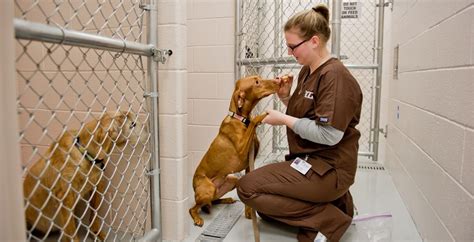Are you passionate about animals and interested in pursuing a career in veterinary medicine? Not only does this field offer the opportunity to provide compassionate care for our furry friends, but it also presents a lucrative career path with promising job prospects. In this blog post, we will explore the various aspects of veterinary medicine salaries, including the rising demand for veterinary professionals, educational requirements, specializations, and career paths. We will delve into the average salaries for veterinarians, the factors that influence these salaries, and the differences in salary between small animal and large animal vets. Additionally, we will discuss how salaries vary in different regions and countries, as well as opportunities for career growth and higher salaries. We will also explore additional income sources in veterinary medicine and provide valuable tips for negotiating a higher veterinary medicine salary. If you’re considering a career in veterinary medicine or seeking to advance in this field, this post is a must-read for you.
Table of Contents
Demand for Veterinary Professionals on the Rise
The demand for veterinary professionals is increasing as more people prioritize the health and well-being of their pets. Pet ownership is on the rise, and with it comes the need for more veterinarians to provide medical care. As more households have pets, the demand for veterinary services continues to grow.
Furthermore, the expansion of the pet industry has also contributed to the increasing demand for veterinary professionals. With a wider range of services available for pets, including specialized medical care, pet owners are seeking out skilled professionals to provide the best possible care for their animals.
In addition, the development of new technologies and treatment methods in veterinary medicine has led to a greater demand for specialists in the field. As the industry continues to evolve, there is a need for professionals with specialized knowledge and skills to meet the diverse needs of pet owners.
Overall, the rising demand for veterinary professionals is a reflection of the growing importance of pets in modern society and the increasing willingness of pet owners to invest in their animals’ health and well-being.
Educational Requirements for Veterinary Medicine
When considering a career in veterinary medicine, it’s crucial to understand the educational requirements to become a licensed veterinarian. The path to becoming a veterinarian starts with obtaining a bachelor’s degree, typically in a science-related field such as biology or animal science. Many veterinary schools also require applicants to have completed specific prerequisite courses, such as chemistry, biology, and animal nutrition.
After completing an undergraduate degree, aspiring veterinarians must then apply to and complete a Doctor of Veterinary Medicine (DVM) program at an accredited veterinary school. These programs usually take four years to complete and include important hands-on clinical experience in addition to classroom instruction.
Upon graduating from a DVM program, individuals must pass the North American Veterinary Licensing Examination (NAVLE) in order to become licensed to practice veterinary medicine. Some states may also require veterinarians to pass a state-specific exam or fulfill additional licensing requirements.
Continuing education is also a crucial component of maintaining a veterinary medicine license, with most states requiring veterinarians to complete a certain number of hours of continuing education courses every year to stay updated on the latest advancements in the field.
Specializations and Career Paths in Veterinary Medicine
When it comes to pursuing a career in veterinary medicine, there are various specializations and career paths for individuals to consider. Veterinary professionals have the opportunity to specialize in areas such as small animal medicine, large animal medicine, exotic animal medicine, equine medicine, and more. Each specialization offers unique opportunities for career growth and the chance to make a positive impact on the health and well-being of animals.
For those interested in small animal medicine, becoming a companion animal veterinarian may be the ideal career path. These professionals work with pets such as dogs, cats, and small mammals, providing routine care, surgical procedures, and preventive medicine. On the other hand, individuals who are passionate about working with livestock and production animals may choose to specialize in large animal medicine, focusing on the health and well-being of animals such as cows, pigs, and sheep.
In addition to these traditional pathways, veterinary medicine also offers opportunities to work with exotic animals, reptiles, wildlife, and zoo animals. These specialties often involve working in unique settings such as wildlife rehabilitation centers, zoos, and conservation organizations, providing healthcare and promoting conservation efforts for a wide range of species.
Ultimately, the field of veterinary medicine offers a diverse range of career paths and specializations, allowing individuals to find their niche and pursue a fulfilling and impactful career working with animals.
Average Salaries for Veterinarians
As the demand for veterinary professionals continues to rise, many are curious about the average salaries for veterinarians. According to the Bureau of Labor Statistics, the median annual wage for veterinarians was $99,250 in May 2020. This means that half of all veterinarians earned more than this amount, while the other half earned less. It’s important to note that this figure can vary based on factors such as experience, location, and specialization.
With the educational requirements for veterinary medicine being quite rigorous, it’s not surprising that veterinarians are well-compensated for their expertise. Those who work in research, public health, or food safety may also command higher salaries. Additionally, veterinarians who specialize in areas such as oncology, surgery, or dermatology often earn more than those in general practice.
When comparing salaries for small animal and large animal vets, it’s common to see differences in compensation. Small animal veterinarians, who primarily work with pets, may earn higher incomes due to the higher demand for their services. On the other hand, large animal veterinarians, who work with livestock, may have more variability in their earnings depending on the local agricultural economy.
Ultimately, the average salaries for veterinarians can be influenced by a multitude of factors. From the type of practice they work in to the location of their employment, veterinarians have the potential to earn competitive salaries while pursuing a career dedicated to animal health and well-being.
Factors Influencing Veterinary Medicine Salaries
One of the factors that can influence veterinary medicine salaries is the level of experience. Veterinarians with more years of experience in the field are likely to earn higher salaries than those who are just starting out. This is because experienced veterinarians have developed a strong skill set and a vast knowledge base, which makes them more valuable to employers.
Another important factor is the geographic location of the veterinary practice. Salaries for veterinarians can vary greatly depending on the region or country in which they work. For example, veterinarians working in urban areas or in areas with a high cost of living may earn higher salaries than those working in rural or less affluent areas.
The type of veterinary practice can also have a significant impact on salaries. For example, veterinarians who work in large animal practices may earn higher salaries than those who work with small animals. This is because working with large animals often requires specialized skills and carries a higher level of risk, which can result in higher compensation for the veterinarian.
Finally, the level of education and specializations within the veterinary field can also influence salaries. Veterinarians who have pursued advanced degrees or certifications in specialized areas of veterinary medicine, such as surgery or internal medicine, may command higher salaries than those with a general veterinary degree.
Comparing Salaries for Small Animal and Large Animal Vets
When considering a career in veterinary medicine, it’s important to understand the differences in salary potential between small animal and large animal veterinarians. Small animal vets typically work with pets such as cats and dogs, while large animal vets work with livestock such as cows, horses, and pigs.
One of the main factors that affects the salary difference between small and large animal vets is the demand for their services. Small animal vets tend to work in private clinics, where there is a high demand for pet care. On the other hand, large animal vets may work in rural areas where there are fewer animals in need of medical attention.
Educational requirements also play a role in the salary discrepancy. Both types of veterinarians need to earn a Doctor of Veterinary Medicine (DVM) degree, but large animal vets may need to pursue additional training in areas such as herd health management and production medicine.
Overall, while small animal vets may earn a higher salary due to the greater demand for their services, large animal vets play a crucial role in the agriculture industry and their specialized training can also lead to lucrative career opportunities.
Salary Differences in Different Regions and Countries
When considering a career in veterinary medicine, it is important to take into account the salary differences that exist in different regions and countries. Salaries for veterinarians can vary greatly depending on the location in which they practice. Factors such as cost of living, demand for veterinary services, and regional economic conditions can all have an impact on the average veterinary medicine salary.
For example, in general, salaries for veterinarians in urban areas tend to be higher than in rural areas. This is often due to the higher cost of living and increased demand for veterinary services in urban centers. Additionally, certain countries may have a higher demand for veterinary professionals, leading to higher salaries overall. In some regions, the need for large animal vets may be greater, resulting in higher salaries for those individuals.
It’s also important to consider the potential for career growth and higher salaries in different regions and countries. Some areas may offer more opportunities for advancement and development, leading to the potential for increased earnings. In contrast, other regions may have a more stagnant veterinary market, with fewer opportunities for career growth.
Ultimately, aspiring veterinarians should carefully consider the potential salary differences in different regions and countries when planning their career paths. Researching and understanding the average salaries for veterinarians in various locations can provide valuable insight into the best opportunities for earning potential in the field of veterinary medicine.
Opportunities for Career Growth and Higher Salaries
There are numerous opportunities for career growth and higher salaries in the field of veterinary medicine. With the increasing demand for veterinary professionals, especially in specialized areas such as exotic animal medicine, emergency care, and dentistry, there is ample room for advancement in the industry.
Veterinarians can pursue advanced training and certification in various specializations, which can lead to higher-paying positions and greater opportunities for career advancement. Additionally, gaining experience in different clinical settings, such as research institutions, pharmaceutical companies, and public health organizations, can also open doors to higher salaries and professional growth.
Furthermore, leveraging networking opportunities and building strong professional connections within the veterinary community can lead to career advancement and access to higher-paying positions. Veterinarians can also explore opportunities for teaching, mentoring, and leadership roles within their field, which can result in increased earning potential and career growth.
In conclusion, the field of veterinary medicine offers a wide range of opportunities for career growth and higher salaries. By pursuing advanced training, gaining diverse experience, and building a strong professional network, veterinarians can achieve greater success in their careers and access higher-paying positions within the industry.
Additional Income Sources in Veterinary Medicine
Many veterinary professionals are finding creative ways to supplement their income through additional income sources in veterinary medicine. One common way is through pet nutrition sales. By recommending and selling specialty diets and supplements to their clients, veterinarians can add a significant income stream to their practice.
Another source of additional income for veterinarians is through offering alternative therapies such as acupuncture, chiropractic care, and physical rehabilitation for pets. These services are in high demand and can add a substantial amount to a veterinarian’s earnings.
Some veterinarians also choose to branch out into teaching and consulting. By offering workshops, seminars, and online courses, they can share their expertise with other veterinary professionals and pet owners, while also generating additional income.
Finally, many veterinarians explore writing opportunities, such as contributing articles to pet magazines, websites, or blogs, or even writing their own book. These avenues can provide a consistent source of additional income, while also allowing veterinarians to expand their reach and influence in the field.
Tips for Negotiating a Higher Veterinary Medicine Salary
When it comes to negotiating a higher veterinary medicine salary, there are several key factors to consider in order to secure the best compensation package possible. One of the most important tips for veterinary professionals is to do thorough research on industry standards, average salaries for their specific field and experience level, and the salaries of veterinarians in similar locations. This information will provide a solid foundation for negotiation discussions with potential employers.
Another valuable strategy for veterinary professionals seeking a higher salary is to emphasize their unique skills, experience, and accomplishments during the negotiation process. By highlighting their specific strengths and contributions, veterinarians can demonstrate the value they bring to a practice or organization, and justify their request for a higher compensation package.
In addition, veterinarians should be prepared to negotiate more than just their base salary. Benefits such as healthcare coverage, retirement plans, bonuses, and flexible work arrangements can also be key components of a comprehensive compensation package. By discussing these additional benefits during the negotiation process, veterinary professionals can further enhance their overall compensation.
Lastly, it’s important for veterinarians to approach the negotiation process with confidence and professionalism. By clearly articulating their value, staying informed on industry standards, and being open to discussing a variety of compensation elements, veterinary professionals can increase their chances of securing a higher salary package that reflects their skills and contributions to the field.





